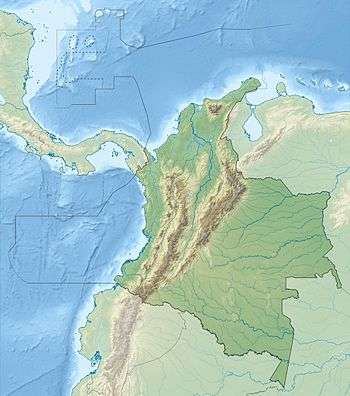Los Katíos National Park
| PNN Los Katíos | |
|---|---|
|
IUCN category II (national park) | |
 | |
| Location |
Antioquia and Chocó, |
| Coordinates | 7°40′0″N 77°00′0″W / 7.66667°N 77.00000°WCoordinates: 7°40′0″N 77°00′0″W / 7.66667°N 77.00000°W |
| Area | 720 km² |
| Established | August 6, 1974 |
| Governing body | SINAP |
| Type | Natural |
| Criteria | ix, x |
| Designated | 1994 (18th session) |
| Reference no. | 711 |
| State Party | Colombia |
| Region | Latin America and the Caribbean |
| Endangered | 2009–2015 |
Los Katíos National Natural Park (Spanish: Parque Nacional Natural Los Katíos) is a protected area located in northwest Colombia which covers about 720 km2 (280 sq mi). The elevation ranges between 50 m (160 ft) and 600 m (2,000 ft). It is a part of the Darién Gap, a densely forested area shared by Panama and Colombia, and is contiguous with the Darién National Park in Panama. The Pan-American Highway when completed as proposed would pass near or through Los Katíos. The park was declared a World Heritage Site in 1994 due to the extraordinary diversity of plant and animal species represented. The park contains over 25% of the bird species reported for Colombia in an area less than 1% of the total Colombian territory.
The topography of the Los Katios National Park is diverse, with low hills, forests and wet plains comprising its total area.[1]
The two largest parts of the park are the Serranía del Darién mountains, which lie to the west, and the Atrato River floodplains in the east. The Atrato River is the fastest-flowing river in the world, and empties an astonishing 4,900 m³ of water into the Caribbean every second. The floodplains hold exceptionally fertile soil and consist of alluvial plains of two types. One consists of low-lying terraces that flood often and the other has high terraces that seldom flood. There are also low hills of up to 250 m elevation and others that are 600 m high. Swampy marshes spread for nearly half of the park's total area. The wetlands of the Atrato floodplain are unique. Cativo, one of the indigenous species, can grow to a height of 50 meters. It lends its name to a formation called 'catival', something that is found nowhere in the world except Colombia, south Central America and Jamaica.[1]
.jpg)
See also
References
- 1 2 "Los Katíos National Park". UNESCO World Heritage Centre. Retrieved 15 March 2013.